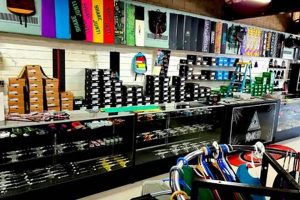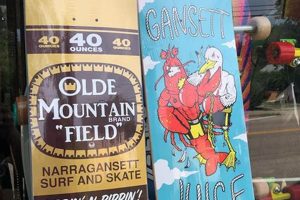Establishments specializing in equipment and apparel related to skateboarding and related activities, located within the geographical boundaries of Atlanta, Georgia, constitute a specific retail sector. These businesses typically offer a range of products, including skateboards, protective gear, footwear, and clothing catering to skateboarders of varying skill levels.
The presence of these retail outlets contributes to the local skateboarding culture by providing access to necessary supplies and fostering a sense of community. They support the pursuit of skateboarding as a recreational activity and a sport, potentially influencing youth engagement and contributing to the city’s overall recreational landscape. Historically, the evolution of these shops mirrors the growth and changing trends within skateboarding itself.
This article will delve into the specific options available within the city, highlighting key characteristics, product offerings, and their role within the metropolitan area’s skateboarding ecosystem.
Selecting the appropriate equipment from vendors within the Atlanta metropolitan area requires careful consideration. Factors such as product quality, selection diversity, and vendor expertise significantly impact the overall skateboarding experience.
Tip 1: Assess Product Quality: Prioritize equipment constructed from durable materials. Examine skateboard decks for multiple plies of high-quality maple, and evaluate trucks for robust construction and responsive turning.
Tip 2: Evaluate Selection Diversity: Look for shops offering a broad range of skateboard types, components, and protective gear. A comprehensive selection ensures the ability to tailor equipment to individual needs and preferences.
Tip 3: Seek Vendor Expertise: Engage with staff possessing in-depth knowledge of skateboarding equipment. Knowledgeable staff can provide informed recommendations based on skill level and intended use.
Tip 4: Consider Location and Accessibility: Evaluate the shop’s proximity to frequently visited skate parks or residential areas. Convenient accessibility encourages regular maintenance and equipment upgrades.
Tip 5: Research Pricing and Value: Compare prices across different retailers, factoring in product quality and included services. Value extends beyond initial cost to encompass long-term durability and performance.
Tip 6: Review Shop Reputation: Investigate customer reviews and online feedback to gauge shop reliability and customer service quality. Positive reviews often indicate a commitment to customer satisfaction.
Tip 7: Inquire About Return Policies: Understand the shop’s return and exchange policies before making a purchase. Clear and fair policies provide recourse in case of equipment defects or incompatibility.
Prioritizing these factors enables informed decision-making, ensuring that equipment purchases align with individual needs and contribute positively to the skateboarding experience.
The subsequent sections will delve into specific establishments within the Atlanta region and their respective strengths and weaknesses.
1. Equipment Availability
The provision of a sufficient range of skateboarding equipment directly correlates with the functionality and appeal of retail locations in Atlanta, Georgia. A limited inventory restricts customer choice, potentially forcing consumers to seek alternatives outside the local area. A comprehensive selection, conversely, attracts a wider customer base and reinforces the shop’s position as a primary resource for skateboarders. For instance, establishments stocking decks from multiple manufacturers, offering a variety of truck sizes, and maintaining a consistent supply of essential components such as bearings and hardware effectively cater to diverse needs.
Specific instances demonstrate the impact of equipment availability. A shop specializing in longboards, for example, will attract customers interested in cruising and downhill skating. Another shop focusing on street skating equipment, with an emphasis on durable decks and grind-resistant wheels, will cater to a different segment. Shops offering a combination of both benefit from broader appeal. Moreover, the prompt replenishment of depleted inventory is crucial, especially for commonly replaced items like grip tape and skate shoes. Consistent stock levels mitigate customer frustration and encourage repeat business.
In conclusion, equipment availability is not merely a logistical concern but a fundamental element of a successful skateboarding retail business. Strategic inventory management, diversification of product lines, and continuous monitoring of demand patterns are essential for shops to effectively serve the Atlanta skateboarding community and maintain a competitive edge within the marketplace. The ability to fulfill customer needs promptly and comprehensively translates directly into customer loyalty and sustained growth.
2. Community Influence
The contribution of retail establishments specializing in skateboarding to the social fabric of Atlanta, Georgia, represents a critical aspect of their overall impact. Beyond the purely transactional function of selling equipment, these businesses often serve as hubs for fostering community engagement and supporting local talent. The nature and extent of this influence varies, but its presence is undeniable within the metropolitan area’s skateboarding culture.
- Sponsorship of Local Events
Skate shops frequently provide financial or in-kind support to skateboarding competitions, demonstrations, and other gatherings. This sponsorship extends beyond mere advertising, actively promoting participation and showcasing local skill. Events such as “Go Skateboarding Day” gatherings or local park contests often rely on skate shop support, enhancing their visibility and sustainability.
- Creation of Safe Spaces and Mentorship
Certain establishments foster inclusive environments, particularly for younger skateboarders. Providing a safe space to learn and practice, away from potentially hazardous street environments, contributes to skill development and minimizes risk. More experienced skateboarders associated with the shop may provide informal mentorship, guiding newcomers and fostering a sense of belonging.
- Partnerships with Local Skate Parks
Collaboration between skate shops and local skate park operators strengthens the overall skateboarding ecosystem. Shops might contribute to park maintenance, advocate for improvements, or host events at these facilities. This symbiotic relationship ensures the continued viability and accessibility of public skateboarding spaces.
- Promotion of Local Brands and Artists
Many shops actively support local skateboarding brands, artists, and videographers. Displaying and selling products from local manufacturers boosts the regional economy and provides a platform for emerging talent. This promotion fosters a sense of regional identity and reinforces the shop’s connection to the local skateboarding community.
The diverse forms of community influence exerted by establishments dedicated to skateboarding within Atlanta collectively shape the city’s skateboarding landscape. Through event sponsorship, the creation of safe spaces, park partnerships, and the promotion of local talent, these shops contribute significantly to the vibrancy and sustainability of the sport within the metropolitan area. The level of community engagement directly impacts the shop’s reputation and its long-term viability within the Atlanta market.
3. Location Accessibility
The ease with which patrons can reach retail establishments dedicated to skateboarding within Atlanta, Georgia significantly influences their success and the overall accessibility of the sport. Proximity to target demographics, transportation infrastructure, and parking availability are key determinants.
- Proximity to Skate Parks and Skate Spots
Establishments situated near designated skate parks or recognized skateboarding locations often experience higher foot traffic. Skateboarders frequently require immediate access to replacement parts or supplementary equipment while actively engaged in the sport. Locating near such venues offers convenience and caters to spontaneous purchasing decisions. For example, a shop adjacent to a popular skate park benefits from increased visibility and accessibility for skaters needing immediate repairs or upgrades.
- Public Transportation Availability
Access to public transportation, such as MARTA rail stations or bus lines, expands the customer base beyond those with personal vehicles. Shops accessible via public transit become viable options for students, individuals residing in areas with limited parking, and those prioritizing environmentally conscious transportation methods. The presence of a nearby bus stop or train station can significantly increase the potential customer pool, particularly in densely populated areas of Atlanta.
- Vehicle Parking and Traffic Congestion
Adequate parking facilities and manageable traffic conditions are essential for attracting customers who rely on personal vehicles. Insufficient parking or heavy traffic can deter potential shoppers, leading them to choose more accessible competitors. Retailers located in areas with ample parking options and efficient traffic flow benefit from increased convenience and a more positive shopping experience. The availability of designated loading zones for equipment transport further enhances accessibility.
- Neighborhood Demographics and Visibility
Strategic placement within neighborhoods with a strong skateboarding culture or a high concentration of potential customers contributes to increased visibility and brand awareness. Locations in areas frequented by young people or near schools often provide a natural customer base. Conversely, placement in areas with limited foot traffic or poor visibility may hinder growth and require more extensive marketing efforts. Identifying and securing locations that align with target demographics is crucial for maximizing accessibility and market penetration.
The collective impact of these factors dictates the extent to which skateboarding equipment and resources are available to the residents of Atlanta. Careful consideration of these elements is essential for establishing and maintaining a thriving skateboarding retail business within the metropolitan area, directly influencing customer acquisition and long-term sustainability.
4. Brand Variety
The diversity of brands offered by establishments specializing in skateboarding within Atlanta, Georgia, represents a critical factor influencing customer choice and market competitiveness. A comprehensive selection caters to a wider range of preferences and budgets, thereby enhancing the overall appeal of the retail location.
- Deck Manufacturers
The availability of decks from various manufacturers, each employing distinct construction techniques, graphic designs, and concave profiles, addresses the individual needs of skateboarders. Shops carrying a curated selection of established brands alongside emerging local manufacturers provide customers with options ranging from proven reliability to innovative designs. The absence of diverse deck brands can limit customer choice and incentivize patronage of competing establishments.
- Truck and Wheel Providers
The variety of trucks and wheels impacts performance characteristics, durability, and aesthetic appeal. Shops stocking components from multiple manufacturers allow customers to fine-tune their setups to specific riding styles. For example, skaters prioritizing street skating might seek durable trucks designed for grinds, while those focusing on park skating may prefer lighter, more responsive options. The lack of a diverse truck and wheel selection restricts customization options and potentially compromises performance.
- Footwear Options
Skate shoes from various brands differ in terms of durability, support, and grip. Establishments offering a range of footwear choices enable skateboarders to select shoes tailored to their individual foot shapes and riding preferences. Shops carrying a diverse selection of skate-specific footwear cater to the demands of the sport, enhancing comfort and performance. A limited footwear selection may result in discomfort, reduced performance, and premature wear.
- Apparel and Accessory Brands
The availability of diverse apparel and accessory brands contributes to the overall aesthetic appeal and functionality of the skateboarding experience. Shops stocking clothing, hats, and accessories from various manufacturers allow customers to express their individual styles while benefiting from products designed for the rigors of skateboarding. The presence of a diverse apparel and accessory selection enhances the shop’s appeal and reinforces its connection to skateboarding culture. A limited selection may deter customers seeking a complete skateboarding lifestyle experience.
In conclusion, the range of brands offered by establishments dedicated to skateboarding within Atlanta significantly influences customer satisfaction and market competitiveness. A comprehensive selection across all product categories, from decks to apparel, caters to a wider range of preferences and enhances the overall skateboarding experience. The ability to provide customers with choices that align with their individual needs and aesthetic sensibilities is essential for attracting and retaining patronage within the dynamic Atlanta skateboarding market.
5. Expertise Level
Within the context of retail establishments specializing in skateboarding in Atlanta, Georgia, the expertise level of staff represents a critical determinant of customer satisfaction and business success. Knowledgeable personnel enhance the shopping experience, provide informed guidance, and contribute to the overall development of the skateboarding community.
- Product Knowledge and Application
Staff members with in-depth understanding of skateboarding equipment, including decks, trucks, wheels, and bearings, are essential for providing accurate recommendations. This knowledge extends beyond mere product specifications to encompass application and compatibility. For example, advising a novice skater on the appropriate deck size and truck configuration based on their height, weight, and intended riding style demonstrates a practical application of expertise. The absence of this expertise can lead to inappropriate equipment selections and potentially hazardous outcomes.
- Skateboarding Technique and Best Practices
Personnel possessing practical experience in skateboarding techniques can offer valuable insights into improving performance and preventing injuries. Demonstrating proper stance, explaining the mechanics of specific tricks, and advising on appropriate protective gear enhances customer confidence and promotes safe skateboarding practices. For instance, demonstrating the correct foot placement for an ollie or explaining the importance of wearing a helmet while learning new tricks showcases a tangible benefit of experienced staff. This expertise contributes to the development of a knowledgeable and safety-conscious skateboarding community.
- Equipment Maintenance and Repair
Staff equipped with the skills to diagnose and resolve common skateboarding equipment issues provide a valuable service to customers. Identifying worn bearings, tightening loose hardware, and performing basic deck repairs extends the lifespan of equipment and reduces the risk of malfunction. Offering advice on proper cleaning techniques and preventative maintenance further enhances the value proposition. The ability to troubleshoot problems and offer practical solutions fosters customer loyalty and reinforces the shop’s reputation as a reliable resource.
- Understanding of Local Skateboarding Culture
Personnel familiar with the Atlanta skateboarding scene, including local skate parks, notable skaters, and upcoming events, can effectively connect with customers and build rapport. This understanding fosters a sense of community and reinforces the shop’s relevance within the local skateboarding ecosystem. For instance, recommending a specific skate park based on the customer’s skill level or informing them about upcoming competitions demonstrates a connection to the local scene. This cultural awareness enhances the shopping experience and fosters a sense of belonging within the Atlanta skateboarding community.
The multifaceted expertise level of staff at skateboarding retail establishments in Atlanta directly influences customer satisfaction, promotes safe skateboarding practices, and contributes to the overall vibrancy of the local skateboarding community. Investment in staff training and recruitment to prioritize expertise is essential for maintaining a competitive edge and fostering long-term success within the Atlanta market. The presence of knowledgeable and experienced personnel transforms a retail establishment into a valuable resource for skateboarders of all skill levels.
Frequently Asked Questions about Skate Shops in Atlanta, Georgia
The following section addresses common inquiries regarding retail establishments specializing in skateboarding equipment and services within the Atlanta metropolitan area.
Question 1: What factors differentiate one skate shop from another in Atlanta?
Differences arise from product selection, staffing expertise, community involvement, pricing structures, and shop location. Evaluating these factors allows for informed decision-making.
Question 2: How can the authenticity of skateboarding equipment be verified before purchase?
Authentication involves examining product details, scrutinizing brand logos, confirming warranties, and consulting with experienced skateboarders regarding reputable brands and retailers.
Question 3: What recourse exists if purchased skateboarding equipment proves defective?
Recourse depends on the retailer’s return policy and the manufacturer’s warranty. Reviewing these documents before purchase clarifies available options for returns, exchanges, or repairs.
Question 4: Do Atlanta skate shops offer services beyond retail sales?
Some shops provide services such as skateboard assembly, equipment repairs, and skateboarding lessons. Inquiring directly with individual shops confirms service availability.
Question 5: How can one locate skate shops that actively support the Atlanta skateboarding community?
Community support manifests through sponsorships, event participation, and promotion of local skaters and brands. Observing shop involvement in local skateboarding events and consulting online resources can provide insights.
Question 6: What are the implications of purchasing skateboarding equipment online versus from a physical shop in Atlanta?
Online purchases offer convenience and potentially lower prices but lack the opportunity for hands-on evaluation and personalized advice. Physical shops provide immediate access to equipment and expert assistance, but pricing may be higher.
The preceding answers provide foundational information regarding the selection and evaluation of skateboarding retail establishments in Atlanta.
The subsequent section will provide a list of retailers within the area to improve your chances to have the item/s you need.
Skate Shops in Atlanta, Georgia
The preceding exploration of skate shops in Atlanta, Georgia, has illuminated key aspects of this retail sector. The availability of diverse equipment, the influence on local skateboarding culture, accessibility considerations, brand variety, and the expertise level of staff are all crucial factors shaping the consumer experience and the overall skateboarding landscape within the metropolitan area.
Continued support and engagement with these establishments are vital for fostering a thriving skateboarding community. Consideration of the factors discussed herein will allow for more informed decisions, ultimately contributing to the continued growth and accessibility of skateboarding in Atlanta.







